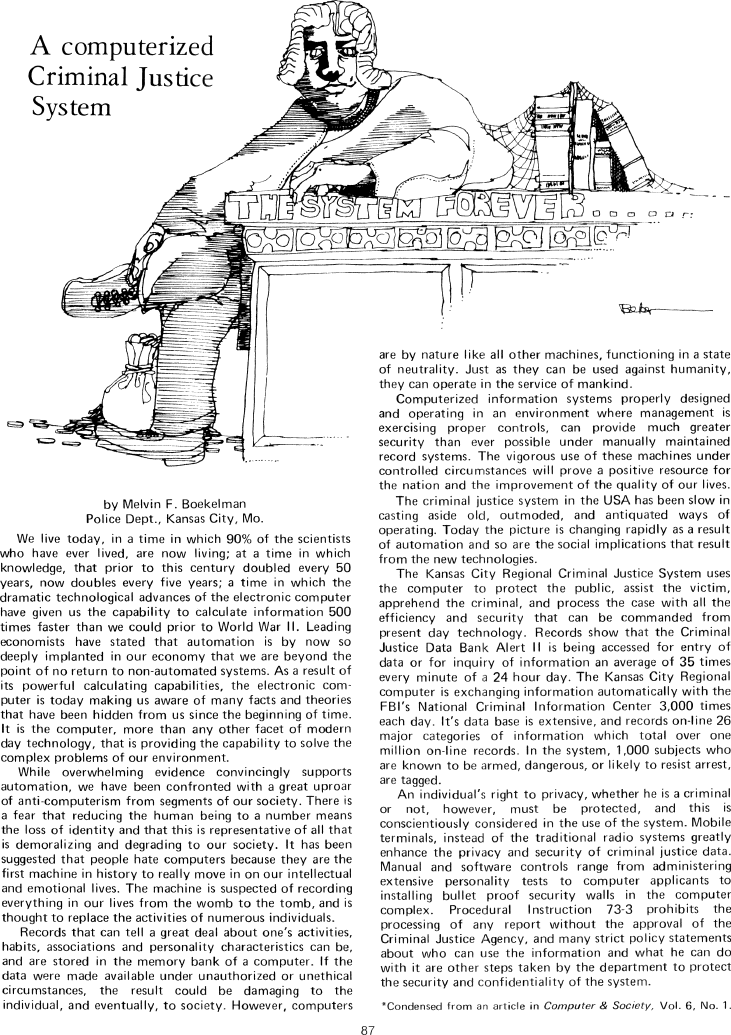The Best of Creative Computing Volume 1 (published 1976)
A Computerized Criminal Justice System (privacy rights)

A computerized Criminal Justice
by Melvin F. Boekelman
Police Dept., Kansas City, Mo
We live today, in a time in which 90% of the scientists who have ever lived, are
now living; at a time in which knowledge, that prior to this century doubled
every 50 years, now doubles every five years; a time in which the dramatic
technological advances of the electronic computer have given us the capability
to calculate information 500 times faster than we could prior to World War II.
Leading economists have stated that automation is by now so deeply implanted in
our economy that we are beyond the point of no return to non-automated systems.
As a result of its powerful calculating capabilities, the electronic computer is
today making us aware of many facts and theories that have been hidden from us
since the beginning of time. It is the computer, more than any other facet of
modern day technology, that is providing the capability to solve the complex
problems of our environment.
While overwhelming evidence convincingly supports automation, we have been
confronted with a great uproar of anti-computerism from segments of our society.
There is a fear that reducing the human being to a number means the loss of
identity and that this is representative of all that is demoralizing and
degrading to our society. It has been suggested that people hate computers
because they are the first machine in history to really move in on our
intellectual and emotional lives. The machine is suspected of recording
everything in our lives from the womb to the tomb, and is thought to replace the
activities of numerous individuals.
Records that can tell a great deal about one's activities, habits, associations
and personality characteristics can be, and are stored in the memory bank of a
computer. If the data were made available under unauthorized or unethical
circumstances, the result could be damaging to the individual, and eventually,
to society. However, computers are by nature like all other machines,
functioning in a state of neutrality. Just as they can be used against humanity,
they can operate in the service of mankind.
Computerized information systems properly designed and operating in an
environment where management is exercising proper controls, can provide much
greater security than ever possible under manually maintained record systems.
The vigorous use of these machines under controlled circumstances will prove a
positive resource for the nation and the improvement of the quality of our
lives.
The criminal justice system in the USA has been slow in casting aside old,
outmoded, and antiquated ways of operating. Today the picture is changing
rapidly as a result of automation and so are the social implications that result
from the new technologies.
The Kansas City Regional Criminal Justice System uses the computer to protect
the public, assist the victim, apprehend the criminal, and process the case with
all the efficiency and security that can be commanded from present day
technology. Records show that the Criminal Justice Data Bank Alert II is being
accessed for entry of data or for inquiry of information an average of 35 times
every minute of a 24 hour day. The Kansas City Regional computer is exchanging
information automatically with the FBI's National Criminal Information Center
3,000 times each day. It’s data base is extensive, and records on-line 26
major categories of information which total over one million on-line records. In
the system, 1,000 subjects who are known to be armed, dangerous, or likely to
resist arrest, are tagged.
An individual's right to privacy, whether he is a criminal or not, however, must
be protected, and this is conscientiously considered in the use of the system.
Mobile terminals, instead of the traditional radio systems greatly enhance the
privacy and security of criminal justice data. Manual and software controls
range from administering extensive personality tests to computer applicants to
installing bullet proof security walls in the computer complex. Procedural
Instruction 73-3 prohibits the processing of any report without the approval of
the Criminal Justice Agency, and many strict policy statements about who can use
the information and what he can do with it are other steps taken by the
department to protect the security and confidentiality of the system.
*Condensed from an article in Computer & Society, Vol. 6, No. 1.


